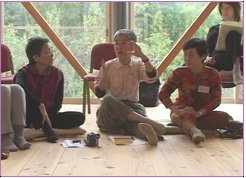About the film

Thirty Years of Sisterhood - introduction
This film is a documentary based on the stories of twelve women who lived the Women’s Liberation movement in Japan in the 1970s. Its creation was motivated by a desire to tell what the “women’s liberation movement” was, to see the road they cultivated and where it was heading.
In the 1970s, women were considered to be second-class citizens in society in general, within social movements including the radical student movement, and in the family. However, there was no social consensus that women were being discriminated against for being women, and women who complained were subjected to ridicule.
The fact that women were considered to be lesser beings in society meant that women’s rights were not regarded as necessary. At the same time, it also meant that women were used as the objects of men’s sexual desires, and women could not claim their own sexuality as truly theirs. It was in this situation that the Women’s Liberation Movement voiced the slogan, “Sexual Liberation.” Moreover, aside from sexual liberation, they also problematized the sexual division of labor within the household, which had previously been considered to be a private realm, and closely intertwined it with the sexual division of labor within society. This division placed women in “feminine roles” and prohibited them from living freely outside the narrow confines of the existing norms and roles for women. Women realized that women’s liberation could not happen through “socialist revolution” or through waiting for “women’s advancement in society,” and thought that the direct liberation of women by women was necessary.
During this period, people with similar thoughts and senses started to raise their voices in many different areas of Japan, and a “Lib Camp” was held. The women in attendance raised their own voices in order to create a movement by talking about their own problems in their own words. Some women also obtained information about the women’s liberation movement in the United States. In translating such information, Japanese women realized that these issues were not just their own problems, but were problems commonly shared by all women in the world.
However, this radical movement was attacked and repressed by society. But this social reaction actually stabilized the movement. It was an extremely harsh situation in which women had to continue fighting 24 hours a day in order to create their own place in society. In particular, the fight in Tokyo, the reactions in the mass media forced the activists and the organization into an extremely difficult situation. However, at the same time, the women there searched for, and lived, their own feelings and thoughts about society that could not be fully expressed in words, and their positions were not always serious but were also sometimes filled with humor.
On the surface, the Women’s Liberation Movement is said to have lasted no more than several years. One of the reasons could be that the women’s liberation movement did not have enough time to find new ways to create and operate their organization. However, the movement did not truly die out after their several most flourishing years. Women’s Liberation, spread throughout Japan by the Lib Camp and the network created from there, still endures today, in local areas and within individuals. Women’s Liberation influenced individuals’ lives, and those who met women’s liberation realized the importance of living their own lives honestly with their own senses and thoughts, not influenced by some traditional values and norms. In their later lives, they still continued searching for how to live their own lives without compromise.
This film is based on interviews with women who continue to live as liberated women. This film was made in order to recount the diverse courses of women’s lives in the women’s liberation movement.

0 Comments:
Post a Comment
<< Home